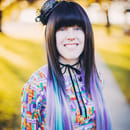In the last few weeks, I’ve seen almost every iteration of the same basic meme across my social media newsfeeds: “In a world full of Kardashians, be a…” with the blank being any number of classic female icons, including Audrey Hepburn, Lucille Ball and Princess Diana.
This meme is awful. Every version of it has the same toxic message: Put a family of women down in order to raise another woman up. It’s made of the same misogynistic DNA as the “You’re not like other girls” trope in popular fiction. The idea is that ‘other girls’ are not special, often because of sexist and stereotypical reasons: They care too much about their appearance, they enjoy shopping and fashion, they post selfies, they use social media frequently, they wear a full face of makeup.
As women, we’re taught to internalize this misogyny and sexism. We’re taught that we have to follow certain ‘rules’ in order to be attractive, both in looks and in personality. We must be drop-dead gorgeous, but we can’t put any personal effort into it by applying layers of makeup, spending time on our hair or picking out attractive outfits. Instead, we’re supposed to roll out of bed just looking perfect. We need to be cool and above the supposed vanity of other women who take selfies, celebrate and love themselves as people.
Popular fiction already pits women against one another. I can’t name how many young adult books or television shows I’ve encountered where the lead female character have few or no healthy relationships with other women. Instead, the main character often feels nothing but jealousy for them, sometimes even to the point of disdain or hatred. Main female characters will spend the first half of a book or movie whining about how they aren’t as pretty as their female counterparts—the popular girl in school, the cheerleader or the slightly-hotter best friend character. Somewhere toward the middle, a guy will pay attention to that leading female, and tell her she isn’t “like other girls.” She won’t understand why he would fall for her, when these other, prettier girls are an option.
That’s what we’re spoon-fed growing up: that our only option is to compare ourselves to other women. Instead of forming solidarity, and maintaining close, healthy relationships with our friends, we’re supposed to be jealous of them, but also pity them for being “just like other girls” at the same time. The fact that the phrase “not like other girls” is even well-known is a problem in and of itself. It suggests that there’s something wrong with other girls.
It doesn’t matter whether you like the Kardashians or not. In this instance, they’re being equated to “other girls.” As women, we need to stand up and say that this sexist treatment is unfair. There is no category of “other girls” who are inferior; it’s a lie that was created by the sexist media. It’s an idea that’s designed to pit women against one another so they don’t realize it’s based in misogyny. If women spend all their time battling each other, they have no time to fight sexism.
Instead of fighting, we should support one another. Women need to stand together, in solidarity, if we want to fight against sexism and internalized mysogyny. There are times when it’s still necessary to criticize other women for problematic actions and statements, but we can’t forget the sexism that they face. Female celebrities and public figures are held to ridiculously high standards built on a foundation of sexism, where they’re criticized one moment and put on a pedestal as the next “It Girl.” We can’t let memes like this win, because it’s not just a funny image that keeps re-circulating online. It represents more than that. Let’s take down the idea of “other girls” and “in a world full of Kardashians.” There’s no such thing as “other girls.” We’re all other girls, and we won’t stop fighting.


